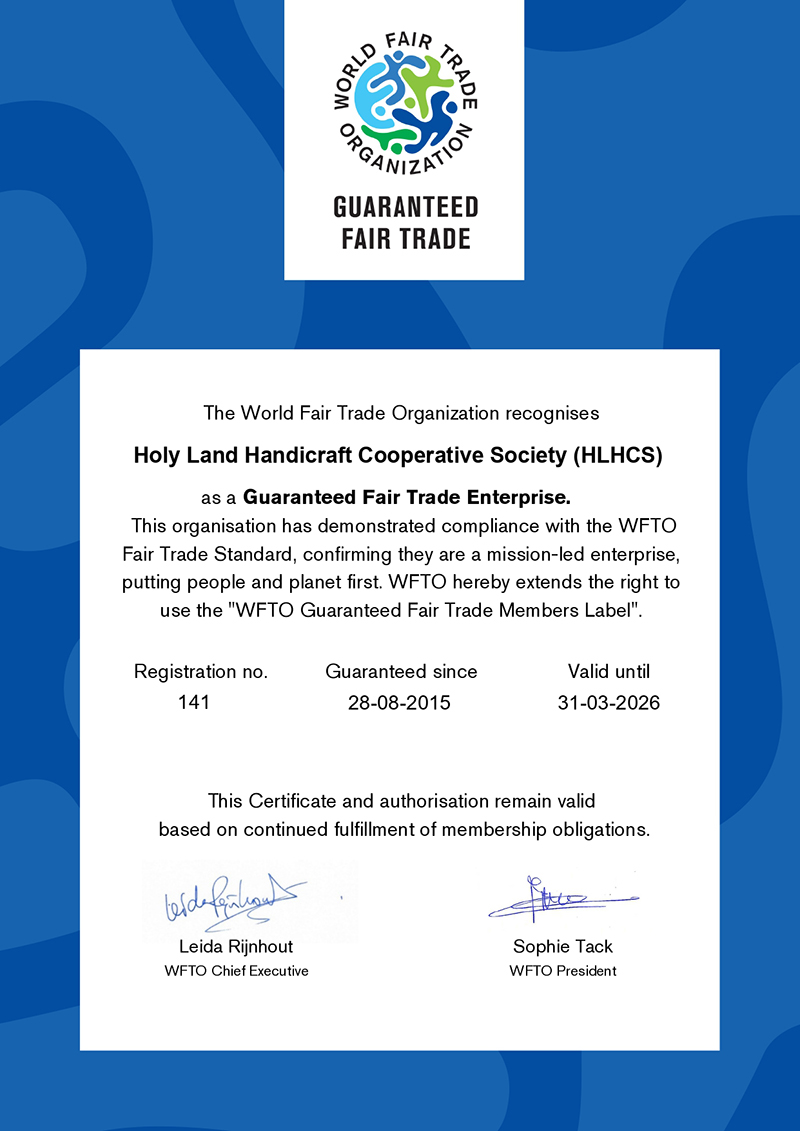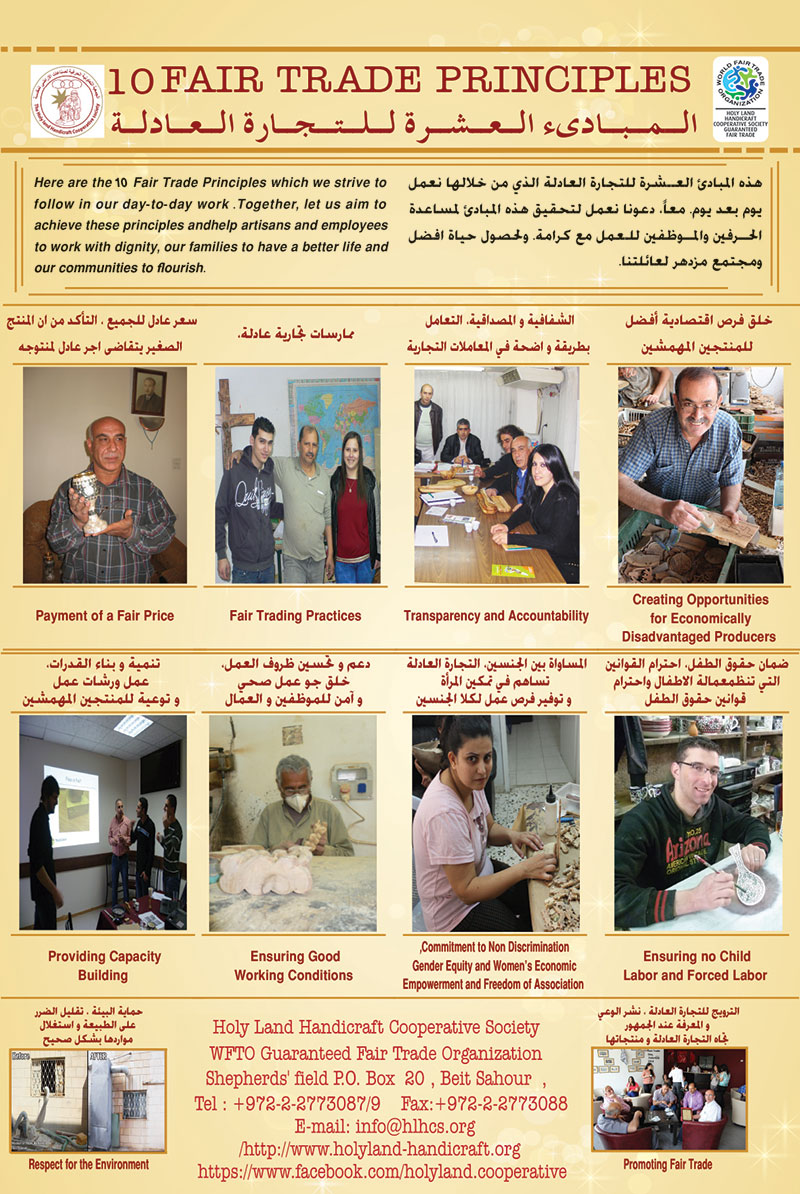The Holy Land Handicraft Cooperative Society is the first (1991) World Fair Trade Organization (WFTO) in the Arab world to qualify for and benefit from WFTO membership. In 2015 started to be a Guaranteed World Fair Trade Organization.
DEFINITION OF FAIR TRADE
"Fair Trade is a trading partnership, based on dialogue, transparency and respect, that seeks greater equity in international trade. It contributes to sustainable development by offering better trading conditions to, and securing the rights of, marginalized producers and workers – especially in the South.
Fair Trade organisations have a clear commitment to Fair Trade as the principal core of their mission. They, backed by consumers, are engaged actively in supporting producers, awareness raising and in campaigning for changes in the rules and practice of conventional international trade." They can be recognised by the WFTO logo.
Fair Trade is more than just trading:
- It proves that greater justice in world trade is possible.
- It highlights the need for change in the rules and practice of conventional trade and shows how a successful business can also put people first.
- It is a tangible contribution to the fight against poverty, climate change and economic crisis.
https://wfto.com/fair-trade/definition-fair-trade
WFTO GUARANTEE SYSTEM (GS)
The GS is not a product certification system. It is an assurance mechanism that Fair Trade is implemented in the supply chain and practices of the Organisation. Members that passed the GS process attain the ‘Guaranteed Fair Trade Organisation’ status and may use the WFTO Label on their products.
The WFTO GS Product Label is more than just a Fair Trade symbol. It signifies not only that the practices across the supply chain are checked against the WFTO Fair Trade Standard, but it also represents support to the battle against poverty and inequality. Products carrying the WFTO Label are made and traded by Guaranteed Fair Trade Organisations dedicated to the sustainable Fair Trade economy. Every purchase of products with the WFTO Label supports small producers and their communities.
https://wfto.com/standard-and-guarantee-system/our-product-label
Fair Trade in Palestine, Vision: As the first organization in the Arab World to qualify for and benefit from WFTO membership, we seek to share our experiences with other groups of farmers and artisans in the region. We aim to be a part of creating awareness that leads to action with regard to Fair Trade in Palestine. Our Goal is to promote WFTO membership to aid Palestinian artisans and producers in marketing through international fair trade channels. Fair Trade principles represent the cornerstones of the Cooperative's philosophy and values. These principles include:
https://wfto.com/fair-trade/10-principles-fair-trade
The Benefits of Fair Trade for Palestinian Handicrafts
- Helps maintain fair and stable prices
- To maintain a Fair Trade certification, workshops are unable to engage in cutthroat, price-slashing competition.
- Artisans benefit, since they are properly compensated for their hours of labor, their skills, and their creativity.
- Tourists and international clients know that the people who produced the products that they buy are compensated fairly for them.
- The local community benefits, since if its citizens are assured of a more stable income they are much less likely to be tempted to emigrate.
- Helps decrease discrimination within the community
- Fair Trade principles mandate that all artisans and producers are treated fairly, regardless of religion, race, or gender. For us, primarily, this signifies not favoring a particular workshop or its products simply because the artisans are Christian or Muslim. Working together to advertise, produce, and sell our products helps us overcome endemic discrimination of this kind.
- Fair Trade also emphasizes the role of women within the workforce. In our more traditional communities, women’s roles are usually restricted to the domestic sphere, but economic pressures have created opportunities (and sometimes pressure) for women to work outside the home. Fair Trade ensures that their work is equally valid, respected and fairly compensated.
- One of the workshops that partners with our Cooperative focuses on training local handicapped people, who would not otherwise have opportunities for work, let alone for their personal artistic development, to make beautiful greeting cards. Our communities, unfortunately, sometimes view the handicapped as a burden rather than as full and potentially productive members of society. Fair Trade encourages us to address these inequalities.
- Environmental Issues and work conditions :
- Fair Trade emphasizes sustainable, environmentally friendly products. We try to address these issues in many different ways: In environmental terms, handcrafted items are much more sustainable than those which are mass produced. The materials that we use are natural, organic, and whenever possible, local, like our olivewood.
- The production of handicrafts in Palestine is the chief means of livelihood. Usually workshops are located in individual homes which has posed a health challenge as production processes generate a lot of dust. With the help of Catholic Relief Services (CRS), HLHCS has become aware of these challenges and is intervening to reduce risks and ensure healthy and safe working conditions for the artisans and the surrounding communities. Many workshops have been renovated in the Bethlehem area, creating job opportunities and changing the lives of direct and indirect beneficiaries. We are the first in Palestine working to improve this sector.
Your support is essential to success with our goals and to turn our dreams into reality



 German
German
 French
French
 Italian
Italian
 English
English

